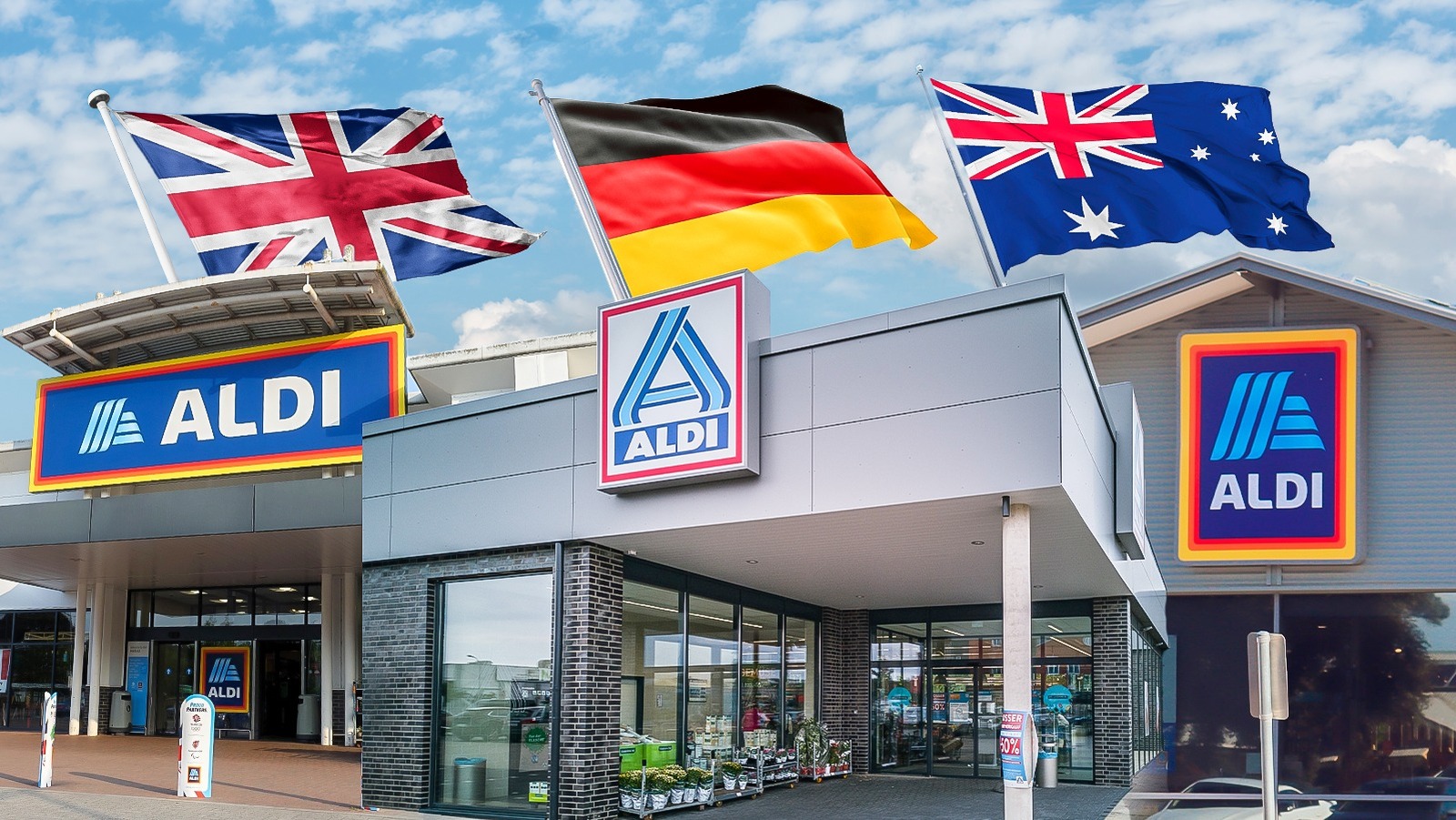Aldi: It’s the cult favorite grocery store that offers good-quality basic staples, relatively low prices, and a shopping experience that’s a bit more streamlined than what an average grocery store has to offer. But what you may not realize as a frequent Aldi shopper is that browsing the store’s aisles in the United States and shopping at an Aldi in another part of the world can be a very different experience.
Aldi got its start in Germany in 1961. It wasn’t until 16 years later, in 1976, that the chain opened its first American location. No, it wasn’t in New York or LA — the first Aldi in the U.S. called Iowa home. Since then, Aldi has grown across the United States to 38 states and over 45,000 employees and across the world, with Aldi locations popping up everywhere from Europe to Asia to Australia.
Go to an Aldi overseas, though, and you just may be surprised at the kind of shopping experience you have there. But don’t worry, you don’t have to travel the globe just to compare and contrast the popular chain’s different locations, because we’ve outlined some of the main differences between international Aldi locations and those you find in the U.S. Although there are many similarities between international Aldis, like cashiers sitting down instead of standing, these differences might just surprise you.
You may need a quarter for a cart in the U.S., but you may not be able to find a cart at a British Aldi at all
One thing that sets Aldi apart from other grocery stores in the U.S. is the fact that, if you want to use an actual (large) shopping cart as opposed to just a basket, you’ll need to make sure you have a quarter on hand. No, it doesn’t actually cost 25 cents just to use a cart, but it does ensure that customers have to bring their carts back to the front of the store if they want to get their quarter back. This cuts down on the number of staff members that are needed to run an Aldi successfully, which is part of what helps keeps prices low. Sure, it’s not the most convenient situation if you don’t happen to have any quarters on hand, but if it means lower prices, we’re in.
However, you may not be able to get a cart at an Aldi in the UK at all, whether you have a quarter on you or not. There are some Aldi locations that only offer traditional baskets and roller baskets, meaning that you might not be able to put quite as much in your cart. The perk, though? No quarter needed.
There aren’t as many ready-to-eat foods in German Aldis
If you have a busy schedule (or, frankly, if you just don’t like to cook), it can be nice to go to grocery stores that offer plenty of ready-to-eat foods. It can cut down on the amount of time you have to spend in the kitchen, and it’s perfect for when you’re planning for a big party and don’t have time to cook everything from scratch. But perhaps convenience is more important to Americans than it is to Germans, because according to some accounts, there are fewer ready-to-eat meals at German Aldis.
Ready-to-eat foods are great when you’re in a hurry and on the go, but you may want to budget a bit more time to make your lunch if you happen to be getting your groceries from a German Aldi — or just be okay with the fact that you will likely have fewer ready-to-eat options at your disposal when you shop there.
You can buy gas at some German Aldis
Most Americans view Aldi as one thing and one thing only: a place to get groceries. It’s not exactly the same kind of place as a bustling Walmart or a Costco that has everything you could possibly need for your kitchen and beyond all in one place. In fact, Aldi stands apart from other stores specifically because it offers less than many of its competitors, promising a more straightforward shopping experience.
The German Aldi’s business model isn’t so completely different from the American one, but some German Aldi locations offer something you definitely won’t find at American Aldis: gas. You won’t be able to find gas at every single German Aldi, but some do house gas pumps in adjacent parking lots, which means that German Aldi-goers can stock up on produce and gas at the same time. This setup may not look like your standard Aldi in the U.S., but it’s one that many Americans — and their wallets — would likely enjoy.
Aldi is known for its snow gear in Australia
If you live in the U.S., you probably don’t think of Aldi as a place where you can buy clothes, much less clothes for highly specific outdoor activities. However, if you frequent Aldi in Australia, you may have a completely different perspective. That’s because Aldi is famous for its annual snow gear sale, which is found on its “Special Buys” shelves. It’s where Aussies stock up on heavy-duty coats and jackets, gloves and mittens that get them through the winter months (or, for those Aussies who live in warmer parts of the country, get them through their ski vacation).
However, in June 2024, there were indications that the snow gear sale was not as popular as it once was, perhaps because of affordability issues within the country. Still, though, in Australia, Aldi is known as a great place to stock up on any necessary winter gear. In the U.S., we probably won’t be heading to Aldi to keep warm this winter, though — unless you count the store’s sweet treats that will get us through the coldest months of the year.
In several countries, you can actually get an Aldi mobile plan
In the United States, Aldi is a grocery store and nothing else. Sure, if you’re an Aldi superfan, it may be your all-time favorite grocery store, but you won’t expect any services from the brand other than providing you the ingredients you need to make your favorite meals for the week. But that’s not necessarily true in every country. In fact, there are several countries in the world where you can actually get an Aldi mobile plan — and apparently, it’s available for a pretty reasonable price.
In Australia, Germany, and the Netherlands, Aldi offers mobile phone plans that are famous for their low prices. There are a variety of different plans available, offering options for just about every kind of mobile phone user. Pay-as-you-go plans offer flexibility for those months when callers may not use their phones much at all. Data plans connect users to the internet, whether it’s on their phones or their tablets. And family plans allow groups of people to come together to get a more affordable mobile phone plan price. Maybe, just maybe, we’ll get Aldi Mobile in the U.S. someday.
Food packaging has health grades at Aldi in Germany
Go to Aldi in the United States and head to the packaged food section, and you may face some confusion about which foods are healthy options and which may not be so good for you if you eat them all the time. Savvy shoppers have to pore over nutrition facts and ingredients lists to really get a good idea of what they’re consuming. However, when you go to Aldi in Germany, you may just notice health “grades” on food packaging. These grades are called Nutri-Scores, and they give consumers information about how healthy or unhealthy the packaged food they’re buying is. These scores range from A, for something like a light salad, to E, for heavier, less nutritionally dense options.
Although these scores can be seen in a variety of grocery stores all around the EU, Aldi’s German brands all contain the condensed nutritional info. It may not be a perfect way of assessing what kinds of foods you should eat regularly and which you should treat yourself to more sparingly, but it may just be easier than searching through the ingredients list for every product you pick up.
Prices at Aldi are lower in the UK than they are in the U.S.
Most of us don’t want to spend a huge portion of our paychecks at the local supermarket. Even if you’re the kind of person who will splurge on groceries from time to time, it’s probably not something that you want to be doing every time you go to the grocery store. But in recent years in the United States, food prices have skyrocketed. In fact, in 2022, grocery prices rose over 11 percent — a bigger jump than any year since 1979. So, it shouldn’t come as too much of a surprise then, that prices at American Aldis are generally higher than they are at UK Aldis.
Of course, that’s a generalization. You’ll find some products in the U.S. that are cheaper than their British counterparts when you make your way down an Aldi aisle in either country, but if you tally the price of your basket at Aldis in both locations, you’ll usually find that Aldi-sourced groceries are cheaper in the UK.
You can sit and eat ready-made foods at Aldis in China
If you mostly shop at Aldi in the U.S., chances are you think of it as a place to go and do your shopping and then get out. While some grocery chains like Whole Foods are known for their hot bar and ready-made foods and accompanying seating area to sit and enjoy your food, that’s not the kind of experience you’re going to have at an Aldi. It may surprise U.S. Aldi shoppers to learn, then, that some Aldis in China actually have areas where you can sit and eat the ready-made food that you buy in the store. This should be an indication that the vibe of Aldi in China is very different than that of Aldis in the U.S.
We love Aldi’s ready-made foods, especially when we want to stock up on quick and easy meals we can take to work or enjoy at home on particularly busy days. But actually sitting down to eat said meal at an Aldi location is probably a foreign experience to most Americans.
Aldi closes on Sunday in Germany but stays open in the U.S.
If you’re looking for a good work-life balance, you’re probably better off in Germany than the U.S. In Germany, for example, workers can expect over a month off of their jobs a year. Americans get considerably less time off. This is largely thanks to laws the German government puts into place to ensure that workers get enough time off to take care of their families and enjoy their lives. One of these laws stipulates that shops have to close on Sundays. Yes, even grocery stores. That means that grocery shoppers have to stock up on the food they need for Sunday by Saturday evening.
In the U.S., though, it’s expected that we can go to the grocery store any time we want, which is why you’ll notice that Aldi is open seven days a week. Yes, it’s definitely more convenient for shoppers, but it doesn’t spell anything positive for our working culture.





